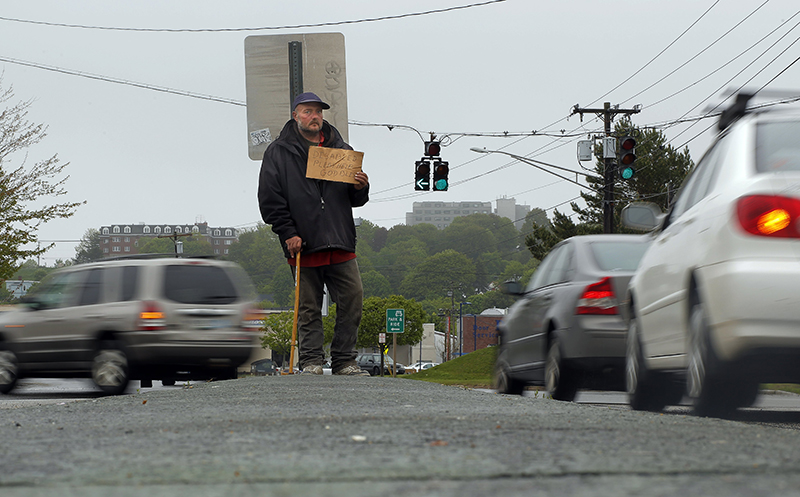PORTLAND – The city is being sued by three residents who claim that its new ordinance against panhandling violates their constitutional right to free speech and should be repealed.
Attorneys representing Michael Cutting, Wells Staley-Mays and Alison Prior filed a motion late Tuesday in U.S. District Court that seeks to prevent the city from enforcing the ordinance that prohibits people from standing on median strips.
In the motion, Zachary L. Heiden, an attorney for the American Civil Liberties Union of Maine, and Kevin Martin, an attorney with Boston-based Goodwin Procter, argue that the ban is unconstitutional because it hinders free speech.
“While this ordinance was framed as an effort to protect public safety, in reality it prohibits a significant amount of peaceful, non-threatening, constitutionally protected speech,” Heiden said in a statement released late Tuesday night by the ACLU.
“The city of Portland should not be in the business of telling people where they can and cannot exercise their constitutional rights, and it should certainly not be banning speech in an area that has traditionally been used as a forum for public dialogue,” Heiden said.
Most panhandlers who stood on medians held signs that said they were homeless and needed money.
The measure to ban panhandling in medians was the subject of several public hearings earlier this year. Police Chief Michael Sauschuck testified that panhandling on medians had grown increasingly dangerous, with some people reaching through drivers’ windows and teetering on the edge of city streets as cars passed.
On July 15, the City Council voted 6-0 to pass the ordinance prohibiting anyone from standing, sitting, driving or parking on a median strip.
Mayor Michael Brennan said the city attorney told him last week that she was unaware of anyone being cited or arrested since the ordinance took effect Aug. 15.
Brennan said Tuesday night that Portland police have instead focused on educating the public and trying to foster voluntary compliance — an approach that he said has been “extremely effective.”
“I think the ordinance has been applied very fairly and evenly and we have seen a noticeable decline (in panhandling),” Brennan said.
Under the ordinance, Portland police can issue civil citations, which can lead to fines of $100 to $500. The ordinance does not apply to panhandling in places other than medians.
Cutting and Staley-Mays are described in the court complaint as political activists who have stood in median strips for years, holding signs that express their political opinions.
Staley-Mays, who belongs to Peace Action Maine, has stood on medians where he has held political signs and handed out flyers.
“To me, it’s an issue of free speech,” he said Tuesday night, “and it’s a way for us to get our message out.”
The complaint says Cutting has lived in Portland since 1991 and has stood on medians with large signs protesting governmental and military action overseas. Cutting has not stood on medians since the ordinance took effect “because he fears a fine or arrest,” the complaint says.
According to the complaint, Prior is homeless and has stood in medians to solicit money to buy food. Her attorneys say she has been homeless since January and has been living with friends and staying at a Preble Street shelter.
Prior says in the complaint that she can collect $10 to $25 while standing on a median over the course of five hours.
She and Cutting could not be reached for comment Tuesday night.
Martin, the attorney from Boston, said that while the city has not taken enforcement action, the threat of fines or arrests has had the effect it desired.
“Simply having a law like this on the books has been chilling and it has inflicted harm on people’s right to free speech,” he said. “To a large degree, most people are too afraid to go onto a median. It’s intimidating.”
Martin said his firm is involved with a similar legal challenge involving the city of Worcester, Mass., and its panhandling ordinance.
He said he argued his case before a judge in June but no ruling has been issued.
Portland officials have an opportunity to respond to the complaint before it goes to a judge, who will rule on the request to keep the city from enforcing the ordinance.
Brennan said Thursday night that he had not yet seen the complaint.
Dennis Hoey can be contacted at 791-6365 or at:
dhoey@pressherald.com
Send questions/comments to the editors.




Success. Please wait for the page to reload. If the page does not reload within 5 seconds, please refresh the page.
Enter your email and password to access comments.
Hi, to comment on stories you must . This profile is in addition to your subscription and website login.
Already have a commenting profile? .
Invalid username/password.
Please check your email to confirm and complete your registration.
Only subscribers are eligible to post comments. Please subscribe or login first for digital access. Here’s why.
Use the form below to reset your password. When you've submitted your account email, we will send an email with a reset code.